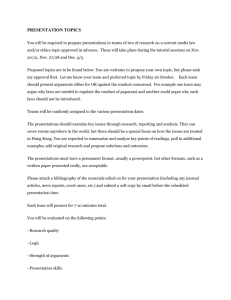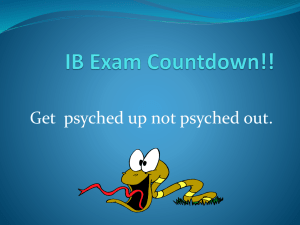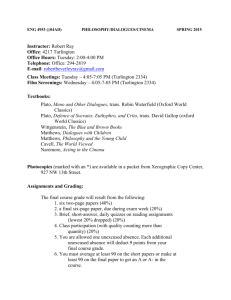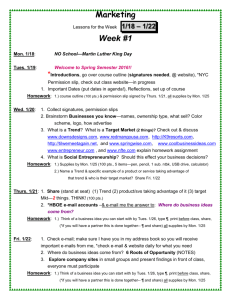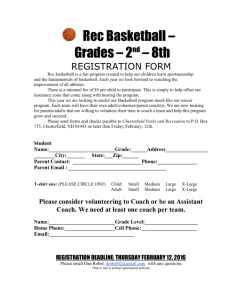530 Syllabus SP15 Sin+ - Western Illinois University
advertisement
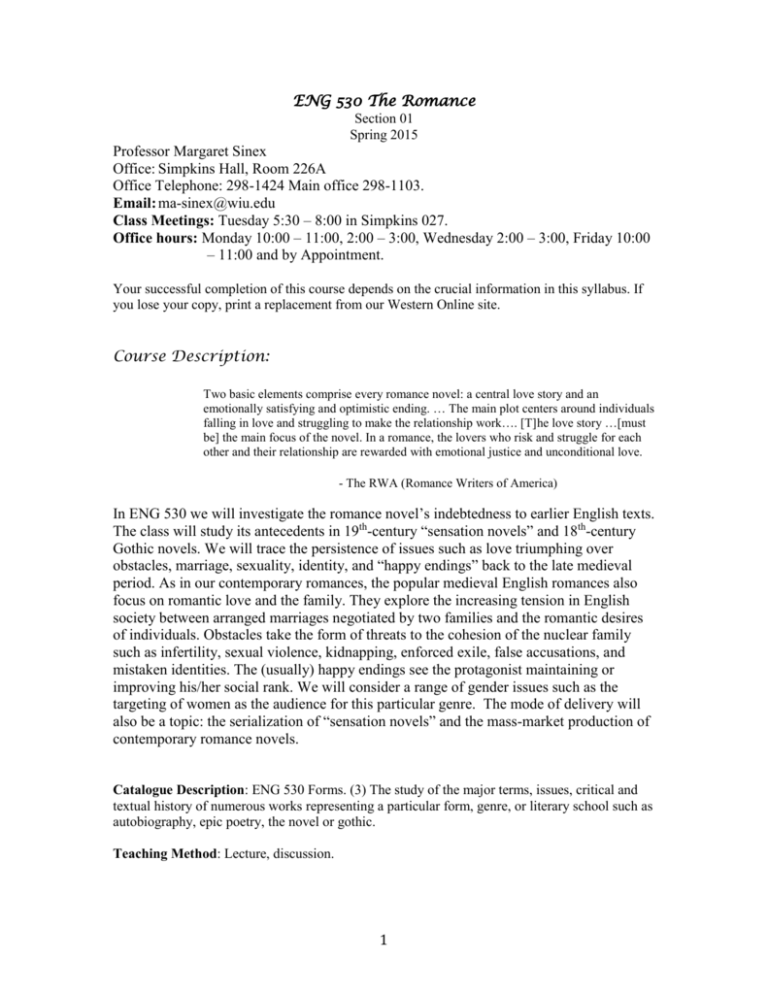
ENG 530 The Romance Section 01 Spring 2015 Professor Margaret Sinex Office: Simpkins Hall, Room 226A Office Telephone: 298-1424 Main office 298-1103. Email: ma-sinex@wiu.edu Class Meetings: Tuesday 5:30 – 8:00 in Simpkins 027. Office hours: Monday 10:00 – 11:00, 2:00 – 3:00, Wednesday 2:00 – 3:00, Friday 10:00 – 11:00 and by Appointment. Your successful completion of this course depends on the crucial information in this syllabus. If you lose your copy, print a replacement from our Western Online site. Course Description: Two basic elements comprise every romance novel: a central love story and an emotionally satisfying and optimistic ending. … The main plot centers around individuals falling in love and struggling to make the relationship work…. [T]he love story …[must be] the main focus of the novel. In a romance, the lovers who risk and struggle for each other and their relationship are rewarded with emotional justice and unconditional love. - The RWA (Romance Writers of America) In ENG 530 we will investigate the romance novel’s indebtedness to earlier English texts. The class will study its antecedents in 19th-century “sensation novels” and 18th-century Gothic novels. We will trace the persistence of issues such as love triumphing over obstacles, marriage, sexuality, identity, and “happy endings” back to the late medieval period. As in our contemporary romances, the popular medieval English romances also focus on romantic love and the family. They explore the increasing tension in English society between arranged marriages negotiated by two families and the romantic desires of individuals. Obstacles take the form of threats to the cohesion of the nuclear family such as infertility, sexual violence, kidnapping, enforced exile, false accusations, and mistaken identities. The (usually) happy endings see the protagonist maintaining or improving his/her social rank. We will consider a range of gender issues such as the targeting of women as the audience for this particular genre. The mode of delivery will also be a topic: the serialization of “sensation novels” and the mass-market production of contemporary romance novels. Catalogue Description: ENG 530 Forms. (3) The study of the major terms, issues, critical and textual history of numerous works representing a particular form, genre, or literary school such as autobiography, epic poetry, the novel or gothic. Teaching Method: Lecture, discussion. 1 Required Texts Braddon, Mary Elizabeth. Lady Audley’s Secret (Oxford World’s Classic). Ed. Lyn Pykett. Oxford and New York: Oxford UP reissue edition, 2012. ISBN019957703X Brontë, Charlotte. Jane Eyre Norton Critical Editions. Ed. Richard A. Dunn. 3rd ed. London and New York: Norton, 2000. ISBN 0393975428 Collins, Wilkie. The Woman in White (Oxford World’s Classic). Ed. John Sutherland. Oxford and New York: Oxford UP, 2008. ISBN 0199535639 Douglas, Michelle. The Rebel and the Heiress (Harlequin Romance\ The Wild Ones) New York: Harlequin, 2014. ISBN 0373743009 Four Middle English Romances: Sir Isumbras, Octavian, Sir Eglamour of Artois, Sir Tryamour. Ed. Harriet Hudson. Kalamazoo, MI: Western Michigan UP. 1996 ISBN187928863X Gibaldi, Joseph. MLA Handbook for Writers of Research Papers. 7th ed. New York: Modern Language Association, 2009. ISBN 9781603290241 Le Fanu, Joseph. Carmilla: A Critical Edition (Irish Studies). Ed. Kathleen CostelloSullivan. Syracuse, NY: Syracuse UP 2013. ISBN 0815633114 Walpole, Horace. The Castle of Otranto (Oxford World’s Classics) Ed. Nick Groom Oxford: Oxford UP, 2014. ISBN 9780198704447. Course Requirements: 5 Summary and Discussion Assignments (4 Pages) 1 Annotated Bibliography 1 Essay (10 to 12 pages) Regular Attendance Evaluation 30% 30% 40% Scale 100 – 95 = A 94 – 90 = A- 89 – 87 = B+ 86 – 83 = B 82 – 80 = B- 79 – 77 = C+ 76 – 73 = C 72 – 70 = C- 69 – 67 = D+ 66 – 63 = D 62 – 60 = D- Course Policies: Communication: I use WIU email to reach students; please supply me with your primary email address today if you do not use your WIU address. You can also drop a note in my mailbox or phone my office number. (The Voicemail is full at the moment.) I post the course syllabus and additional assigned readings on Western Online; I do not make use of its other functions. Failure to comply with the following policies will lower your grade. 1. Attendance and Participation: Your regular, punctual attendance in class is mandatory. For this class, you have one unexplained absence. After that, each class missed will result in eight points off your final grade (out of a possible 100 points) for the course. Participation in the class 2 discussion is essential to forming a reading community in this course; consequently, participation is an integral part of your final grade. If you are present in body but never speak or fail to read the assignment, or asleep you are not participating. 2. All assigned reading must be completed in its entirety for the classing meetings as noted in the Course Schedule. 3. Essays must be typed and are due on the assigned date at the beginning of class. Phone me or email me before the due date if you have a legitimate reason for being unable to meet a deadline and we may be able to accommodate you. 4. Behavior that is discourteous to your fellow classmates and consistently interferes with his or her learning experience in our classroom will not be tolerated. Please treat one another with the consideration and respect each of you deserves. No verbal attacks on a classmate are permissible. Using profanity before the class begins, during class or following class is not acceptable. Entering the classroom late and leaving the room during the period are distracting to your classmates and intensely annoying to me. Cell phones and all other devices will be turned off before entering the classroom. Remove your baseball cap for the duration of class. Why? Because the university classroom is a formal space reserved for discussion and lecture and men do not wear hats indoors in formal spaces. Remember: if you can see my face clearly, I can see yours with equal clarity. Consider your facial expression during class period. 5. Academic dishonesty: Academic dishonesty, including but not limited to “plagiarism, fabrication and falsification, [and] cheating” will not be tolerated and will be dealt with in accordance with Western Illinois University’s Student Academic Integrity Policy. To learn about infractions and procedures see: www.wiu.edu/policies/acintegrity.php. In her A Pocket Manual of Style 6th ed., Diana Hacker defines plagiarism as “(1) failing to cite quotations and borrowed ideas, (2) failing to enclose borrowed language in quotation marks, and (3) failing to put summaries and paraphrases in your own words” (115). Americans with Disabilities Act: “In accordance with University policy and the Americans with Disabilities Act (ADA), academic accommodations may be made for any student who notifies the instructor of the need for an accommodation. For the instructor to provide the proper accommodation(s), you must obtain documentation of the need for an accommodation through Disability Support Services and provide it to the instructor. It is imperative that you take the initiative to bring such needs to the instructor’s attention, as he/she is not legally permitted to inquire about such particular needs of students. Students who may require special assistance in emergency evacuations (i.e. fire, tornado, etc.) should contact the instructor as to the most appropriate procedures to follow in such an emergency. Contact Disability Support Services at 298-2512 for additional services.” Course Schedule: The schedule is subject to change according to the needs of the class. All changes will be announced in a timely manner; it is your responsibility to keep informed of any alterations in the schedule. Additional readings will be assigned to some classes. Week 1 Jan. Tues. 20 Introduction and Syllabus 3 Week 2 Tues. 27 Read The Rebel and the Heiress Week 3 Feb. Tues. 3 The Castle of Otranto. Introduction and Note on Text p. i – xxxviii; Preface to the First Edition, Preface to the Second Edition and Text p. 1 – 105. Summary and Discussion #1 Due. Week 4 Tues. 10 Jane Eyre p. 1 – 130 (through chapter xv). Sign up for individual conferences. Week 5 Tues. 17 Jane Eyre p. 130 – 253 (through chapter xxvi). Sign up for individual Conferences. Week 6 Tues. 24 Jane Eyre Finish (to p. 385) Summary and Discussion #2 Due. Week 7 Mar. Tues. 3 Sir Eglamour of Artois. General Introduction p. 1 – 5; Introduction to Sir Eglamour p. 115 – 120; Text p. 121 – 171 (1319 lines). Week 8 Tues. 10 Octavian. Introduction to Octavian p. 45 – 52; Text p. 53 – 105 (1848 lines) Week 9 M 16 March Break. No Class. Week 10 Tues. 24 Carmilla Introduction p. xvii – xxvi; Text p. 3 – 96. Summary and Discussion #3 Due. Week 11 Tues. 31 The Woman in White. Introduction p. vii – xxiii; Text to p. 212 (Through Chapter I of The Second Epoch). W 1 PCA Apr. Week 12 Tues. 7 The Woman in White to p. 422 (Through Chapter I of The Third Epoch) Annotated Bibliography Due. 4 Week 13 Tues. 14 The Woman in White Finish (to p. 643). Summary and Discussion #4 Due. Week 14 Tues. 21 Lady Audley’s Secret Introduction p. vii – xxix; Text p. 7 – 132 (Through Vol. I Chapter XIX) Week 15 Tues. 28 Lady Audley’s Secret p. 132 – 261 (Through Vol. II Chapter XIII) Summary and Discussion #5 Due. Week 16 May Tues. 5 Lady Audley’s Secret Finish (to p. 373). Week 17 Exam Week Tues. 12 at 6 PM Final Paper Due. 5



